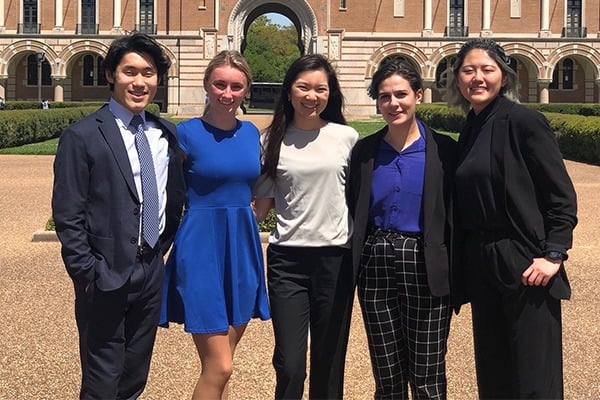The Johns Hopkins Biomedical Engineering student innovator team, PneuTech, was recently selected to advance to the next stage of the VentureWell E-Team Program. PneuTech was recognized for the potential of their invention to create a positive social, health, or environmental impact. The team also received a $20,000 Stage 2 grant, and will take part in the Propel workshop, part of VentureWell’s nationally-recognized Early-Stage Innovator Training Program.
PneuTech is developing a lung biopsy needle attachment to decrease the risk of major procedural complications. According to the team, the current standard of care uses a straight needle guided by computed tomography (CT), making it a challenge to direct the needle to the target site while navigating around critical structures, such as major blood vessels, airways and ribs. Additional punctures may be necessary to obtain an adequate sample, increasing the likelihood of a collapsed lung.
The team is designing a novel needle system equipped with the ability to access any target site in any location while minimizing the number of necessary punctures.
“The use of our device by physicians has the great potential to decrease the risk of lung collapse during lung biopsy procedures from 20% to 0% and thus reduce patient pain,” said team member Katherine Kovrizhkin. “It will also eliminate the need for patients to return to the hospital for repeat procedures as it can collect up to eight times more tissue in one puncture than the standard of care which will save hospitals significant costs.”
During the Early-State Innovator Training Program, PneuTech will be provided with training, coaching, and peer networking opportunities to help them launch their innovation. Students will map and validate the pathway for their venture, digging into business model design and mapping action plans to engage stakeholders and de-risk their venture.
“We are so excited to receive this grant as it will enable us to reach our next major milestone of thoroughly validating and testing our prototypes,” said team leader Ashley Tsang. “Our device has already shown promising results from initial testing, so we look forward to conducting rigorous testing along with our clinical sponsor and interventional radiologist, Dr. Robert Liddell, and his colleagues at the hospital. We are also looking forward to attending the Propel workshop, which will guide us in our business strategy and positioning ourselves in the market to reach commercialization and adoption of our device.”

